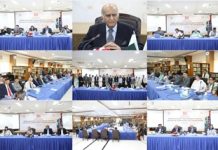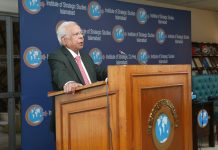Address by Foreign Secretary, H.E. Mr. Aizaz Ahmad Chaudhry
at the Launch of Nuclear Paper Series by
The Institute of Strategic Studies Islamabad (ISSI)
(February 12, 2016)
The launch of Nuclear Paper Series is a welcome initiative by the Institute of Strategic Studies Islamabad. The papers being launched under this initiative delve into three inter-related themes and will help contribute to the debate on strategic stability in South Asia and how it is impacted not only by regional developments but also by the approach of international community, in particular that of the major powers, towards the region.Academia and think tanks have an important role to play in bringing a fresh outlook on issues, evaluating them from diverse perspectives and thus broadening policy options for policy makers and enlightening the general public about issues in which it is a direct stakeholder. I would like to congratulate Ambassador Masood Khan that under his leadership ISSI is endeavoring to perform these functions admirably. I would also like to express my appreciation for the authors of these papers for a job well done.
Academia and think tanks have an important role to play in bringing a fresh outlook on issues, evaluating them from diverse perspectives and thus broadening policy options for policy makers and enlightening the general public about issues in which it is a direct stakeholder. I would like to congratulate Ambassador Masood Khan that under his leadership ISSI is endeavoring to perform these functions admirably. I would also like to express my appreciation for the authors of these papers for a job well done.
We are a peace-loving nation that was compelled to acquire nuclear deterrence in the face of a grave threat that we could have ignored only at great peril to our national security and sovereignty. Pakistan’s reluctant entry into the nuclear club is well documented. After 1974 when the first nuclear test was conducted in our neighborhood, Pakistan made several proposals for keeping South Asia free of nuclear weapons and missiles. These included simultaneous application of IAEA safeguards on all nuclear facilities and bilateral arrangement for their reciprocal inspections; simultaneous accession to the NPT; regional CTBT; Zero Missile Regime in South Asia; and signing of a Non-Aggression Pact. Unfortunately, none of these proposals met a favorable response. Neither did the wider international community intervene to assuage our security concerns. This left us with no option but to develop nuclear deterrence in the pursuit of undiminished and equal security which is a right enshrined in the final document of the UN General Assembly’s First Special Session on Disarmament.
In the wake of South Asia’s overt nuclearization, we have demonstrated our commitment to peace and stability in the region by putting forward the comprehensive strategic stability proposal, which is premised on three interlocking and mutually reinforcing elements of conflict resolution, nuclear and missile restraint and conventional balance. This proposal remains on the table. If pursued with sincerity, this proposal can lay the foundation of lasting peace and stability in the region.As a nuclear state, Pakistan has always
As a nuclear state, Pakistan has always endeavuored to fulfill its international obligations. Despite not being a party to the Non Proliferation Treaty, we have placed all our civilian nuclear facilities under IAEA safeguards with an impeccable and faithful compliance record. Pakistan has a four-decade long experience of safe and secure operation of nuclear power plants.Our nuclear safety and security measures are in line with the best international standards and practices. Over the past fifteen years or so, Pakistan has taken a series of measures which include,
Our nuclear safety and security measures are in line with the best international standards and practices. Over the past fifteen years or so, Pakistan has taken a series of measures which include, establishment of a robust command and control system, an effective export control regime, and steps to improve nuclear security at all levels. We are also actively and constructively engaged with the international community including the IAEA, Nuclear Security Summit process and the Global Initiative to Combat Nuclear Terrorism (GICNT).
Our strong credentials as a nuclear state qualify us for being mainstreamed in the global nuclear order. The global nonproliferation regime also stands to gain from our membership.
In order to meet its exponentially increasing energy needs and to support sustained economic growth and industrial development in the years to come, civil nuclear power generation is an imperative necessity for Pakistan. Our energy requirements are expected to grow by a factor of 7 over the next two decades. Hence, our national goal to expand our nuclear energy capacity to 50,000 MW as envisaged by the Vision 2050. In order to meet this objective Pakistan needs to be granted NSG membership in accordance with a non-discriminatory, uniform and criteria-based approach. Pakistan’s membership would also be of immense benefit to NSG’s credibility and effectiveness as a non-proliferation regime.
Strategicstability in South Asia has been negatively impacted by the Indo-US nuclear deal and the discriminatory waiver granted to India by NSG. The apprehensions expressed by us and shared by objective analysts are turning out to be fully justified by subsequent developments. The recent reports by NTI, ISIS and other assessments by international experts corroborate that the NSG waiver has allowed India to exponentially increase its fissile material stocks with grave implication for strategic stability in the region.In order to ensure South Asia’s long term peace, stability and prosperity, it is essential for the international community to adopt an approach to this region that is even-handed and criteria-based rather than driven by strategic and commercial considerations or political expediency.
In order to ensure South Asia’s long term peace, stability and prosperity, it is essential for the international community to adopt an approach to this region that is even-handed and criteria-based rather than driven by strategic and commercial considerations or political expediency.
Pakistan’s conduct as a nuclear weapon state will continue to be defined by restraint and responsibility. As we seek to ensure our national security, credible minimum deterrence remains our guiding principle. We will also continue to pursue constructive engagement with the international community including the non-proliferation regimes as a confident and responsible nuclear state.
Pakistan believes that the scarce resources of our region should be devoted to the socio-economic development of our people. We need a willing and constructive partner to tackle myriads of daunting challenges that beset our region including disease, poverty, illiteracy, climate change and environmental degradation. A peaceful neighbourhood is the sine qua non to build prosperous societies.
I would conclude my remarks by once again congratulating the Institute of Strategic Studies for producing these well-researched papers which will help further crystallize the discourse around nuclear issues in South Asia.













